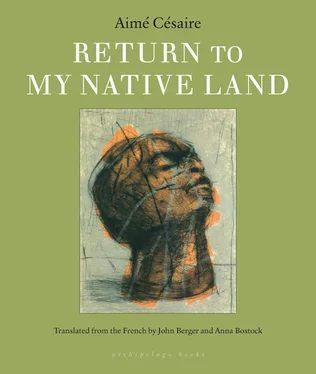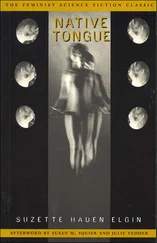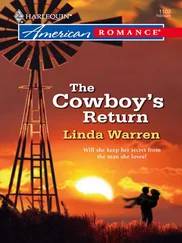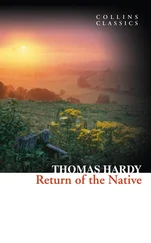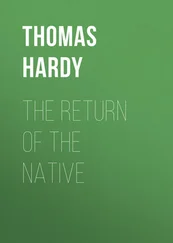My far distant happiness which makes me aware of my true misery: a lumpy road plunging into a hollow where it scatters a handful of huts: a tireless road charging at full speed towards a hill at whose top it is brutally drowned in a stagnant pool of dwarfish houses, a road madly climbing, recklessly descending, and the wooden wreck comically hoicked up on tiny cement legs which I call ‘our home’, its hairdo of galvanized iron buckling in the sun like a drying hide, the dining room, the rough floor with its glistening beads of nails, the rafters of pine and shadow which run across the ceiling, the ghostly chairs of straw, the grey light of the lamp, varnished and quick with cockroaches, the lamp buzzing till it hurts …
At the end of the small hours, this most essential country restored to my greed which wants no foggy tenderness but is the twisted sensual concentration of the Morne’s fat nipple with the accidental palm tree as its hardened germ, the jerking spunk of the streams, the great hysterical tongue of the sea from Trinité to Grande Rivière.
Then time passed by quickly, very quickly.
August when the mango trees sport moons: September — midwife of cyclones: October — burning sugarcane, November which purrs in the stills. And now Christmas beginning.
Its coming was first felt in the prickling of desires, a thirst for new tenderness, the budding of vague dreams, then suddenly it took wing in the violet silk rustle of its great wings of joy, and over the borough it plunged down and burst open the life inside the huts like an over-ripe pomegranate.
Christmas was not like other holidays. It did not want to run in the streets, dance in the public squares, straddle wooden horses, take advantage of the crush to pinch women, throw fireworks in the face of tamarisks. Christmas had agoraphobia. What it wanted was a day of continual bustle and preparation and kitchen-work, a day of cleaning and anxiety
in-case-there’s-not-enough,
in-case-we-run-short,
in-case-they-think-it-dull,
then in the evening a small church, not intimidating, allowing itself to be filled benevolently with laughter and whispers, confidences, declarations of love, rumours, and the keen, throaty discords of the choir leader, and hearty men and tarty girls and homes with their entrails stuffed with succulence, no counting pennies today, and the town now nothing but a bouquet of songs, it is good to be inside, to eat well and drink with warmth, blood sausage two fingers thin like a twisty stalk, or blood sausage broad and thick, the mild sort tasting of wild thyme, the hot kind blazing with spice, scalding coffee sweet aniseed cordial milk punch, rums of liquid sun, and good things to eat which brand your mucous membranes or distil them to delight or weave fragrances across them, when somebody laughs, when another sings, and the refrains spread like coconut palms as far as you can see:
ALLELUIA
KYRIE ELEISON … LEISON … LEISON
CHRISTE ELEISON … LEISON … LEISON
Not only the mouths are singing, but hands, too, feet, buttocks, genitals, the whole fellow creature flowing in sound, voice and rhythm.
When the joy reaches the highest point of its ascent, it bursts like a cloud. The songs do not stop, but anxious and heavy they roll now along valleys of fear and tunnels of anguish, through the fires of hell.
Everyone tries to tweak the tail of the nearest devil until imperceptibly fear is abolished in the fine sand of dreams, and you live truly in a dream, drinking and shouting and singing in a dream, and dozing in a dream with eyelids like rose petals, the daylight comes velvety like the sapodilla berry, the smell of liquid manure from the coconut palm, the turkeys picking off their red pimples in the sun, the obsession of the bells, and the rain,
the bells … the rain …
ringing, ringing, ringing …
At the end of the small hours, this town, flat, displayed …
It crawls on its hands without the slightest wish ever to stand up and pierce the sky with its protest. The backs of the houses are afraid of the fire-truffled sky, their foundations are afraid of the drowning mud. Scraps of houses that have settled to stand between shocks and undermining. And yet this town advances. Every day it grazes further beyond the tide of its tiled corridors, shame-faced blinds, sticky courtyards, dripping paintwork. And petty suppressed scandals, petty shames kept quiet and petty immense hatreds knead the narrow streets into lumps and hollows where the gutter pulls a face among the excrement …
At the end of the small hours: life flat on its face, miscarried dreams and nowhere to put them, the river of life listless in its hopeless bed, not rising or falling, unsure of its flow, lamentably empty, the heavy impartial shadow of boredom creeping over the quality of all things, the air stagnant, unbroken by the brightness of a single bird.
At the end of the small hours: another house in a very narrow street smelling very bad, a tiny house within its entrails of rotten wood shelters rats by the dozen and the gale of my six brothers and sisters, a cruel little house whose implacability panics us at the end of every month, and my strange father nibbled by a single misery whose name I’ve never known, my father whom an unpredictable witchcraft soothes into sad tenderness or exalts into fierce flames of anger; and my mother whose feet, daily and nightly, pedal, pedal for our never-tiring hunger, I am even woken by those never-tiring feet pedalling by night and the Singer whose teeth rasp into the soft flesh of the night, the Singer which my mother pedals, pedals for our hunger night and day.
At the end of the small hours, my father, my mother, and over them the house which is a shack splitting open with blisters like a peach-tree tormented by blight, and the roof worn thin, mended with bits of paraffin cans, this roof pisses swamps of rust onto the grey sordid stinking mess of straw, and when the wind blows, these ill-matched properties make a strange noise, like the sputter of frying, then like a burning log plunged into water with the smoke from the twigs twisting away.… And the bed of planks from which my race came, all my race from this bed of planks on its legs of kerosene drums, a bed with elephantiasis, my grandmother’s bed with its goatskin and its dried banana leaves and its rags, a bed with nostalgia as a mattress and above it a bowl full of oil, a candle-end with a dancing flame and on the bowl, in golden letters, the word MERCI.
A disgrace, Paille Street,
a disgusting appendage like the private parts of this town, whose sea of grey-tiled roofs extends to left and to right all along the colonial road; whereas here there are only roofs of straw, stained brown by sea-spray, worn thin by the wind.
Everyone despises Paille Street. It’s there that the young people of the town are led astray. It’s there that the sea especially dumps its refuse, its dead cats and its dogs. For the street ends on the beach, and the beach is not enough to satisfy the foaming rage of the sea. A misery, this beach of rotting garbage, the furtive rumps of creatures relieving themselves, and the sand black, dismal, black sand such as you never saw, the sea-scum slides over it, yelping, and the sea hits hard at this beach like a boxer, or rather the sea is a great dog licking and biting the shins of the beach, and in the end the biting dog will surely devour this beach and Paille Street along with it.
At the end of the small hours, the rising wind of the past, of broken faith, of an undefined duty slipping away … and those other small hours, the early morning of Europe …
To leave.
As there are hyena-men and panther-men,
so I shall be a Jew man
a Kaffir man
a Hindu-from-Calcutta man
a man-from-Harlem-who-hasn’t-got-the-vote
Читать дальше
